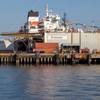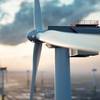Ukraine in "Emergency" Talks Over Gas Imports
Ukraine is in emergency talks with European neighbours on the possibility of importing natural gas from the West, following "political" rises in the price it pays for Russian gas, Prime Minister Arseny Yatseniuk said on Friday.
The urgency of securing affordable supplies for Ukraine's struggling economy has grown since Moscow raised its discounted gas tariff for Kiev twice this week, almost doubling it in three days.
Relations between Ukraine and Russia have turned hostile since popular protests in Kiev ousted pro-Russian president Viktor Yanukovich in February, after which Russia seized Ukraine's Crimea region and formally annexed it last month.
The dispute has widened into the biggest stand-off between Russia and the West since the end of the Cold War.
Ukraine covers 50 percent of its gas needs with Russian supplies and also acts as a transit country for onward supplies to European Union countries. It will soon get money from the International Monetary Fund under a new loan package but faces large debts and its economy is in chaos.
"We are carrying out emergency talks with our European partners. One way to solve the problem is reverse gas from EU countries," Yatseniuk told reporters, adding that the main candidates for imports were Slovakia, Hungary and Poland.
Reverse flows would involve sending gas back down the pipelines used in the transit of Russian gas through Ukraine to Europe.
"On a technical level, the idea of reverse gas raises no problems, and we hope our European partners make the right decision. If it will be to reverse (gas), then it means the price for gas will be $150 dollars lower than Russian gas."
Russia has raised the price of gas to $485 per 1,000 cubic metres for Ukraine, which means it now pays about the same as Gazprom, Russia's monopoly gas exporter, charges other customers in central Europe.
The discounted price had been part of Moscow's strategy of keeping Ukraine's centre of political gravity to the East and countering any leanings towards closer ties with Europe.
It was Yanukovich's rejection of a trade and cooperation deal with the EU that triggered the months of protests that brought him down.
Yatseniuk has called the price hikes "unacceptable" and warned that he also expects Russia to increase pressure on Kiev by limiting supplies.
Moscow has frequently used energy as a political weapon in dealing with its neighbours, and European customers are concerned Russia might again cut off deliveries.
"At this price for gas, Ukraine will most likely continue to import and ratchet up its debt. It will happen until either side decides to go to arbitration or Russia decides to cut off deliveries of gas to Ukraine," said independent energy analyst Valentin Zemlyansky.
"If it goes to the court, we could expect a very long ordeal, but if Gazprom cuts supplies, Ukraine will take gas from volumes intended for European consumers," he said.
Limited Revesrse Capacity
Europe's natural gas pipeline infrastructure is designed to flow from East to West, pumping Russian gas, which meets around a third of EU demand, through Ukraine into western Europe.
Currently around 40 percent of Russia's exports to Europe flow through Ukraine, with the rest sent to Germany via the Nord Stream pipeline under the Baltic Sea and via the Yamal Europe pipe through Belarus and Poland.
Poland opened its first West-East gas link on Tuesday as part of a European Union drive to ensure greater supply.
Valery Nesterov of Moscow-based Sberbank CIB said reverse gas flows from Europe to Ukraine could not go beyond 5 bcm this year, which only represents about 8 percent of Ukrainian demand.
Poland has a reverse capacity of 1.5 bcm to Ukraine, while Hungary is able to send 3.5 bcm. Romania has the potential for 1.8 bcm, but there has been no firm agreement on its use.
Regualtory Obstacles
Energy consultancy Wood Mackenzie said regulatory obstacles also had to be overcome to enable more reverse flows.
Ukraine's energy minister Yuri Prodan said Ukraine wanted to buy gas from neighbouring Slovakia, but Slovakia's gas company had declined to allow Ukrainians to examine its current transit facilities.
Slovakia's Eustream, which operates the gas network, denied it had turned away Ukrainian requests to inspect its facilities.
"Eustream is prepared for cooperation with its Ukrainian partners on reverse flows. Eustream is in touch with its Ukrainian partners as well as with the European Commission's representatives, doing the maximum to move cooperation forward," a Eustream spokesman said.
Slovakia is the EU gateway for Ukrainian supplies, with the potential to reverse flow more than 20 bcm into Ukraine, which could meet over a third of the country's gas demand, but not in a hurry.
Analysts said it could take another six months for gas to actually start flowing from Slovakia to Ukraine, and that the link would unlikely flow at maximum reverse capacity.
Eustream said, "Meetings scheduled for the next few days should provide answers to questions of technical, financial and time nature".
(Additional reporting by Denis Pinchuk in Moscow and Alexander Winning in London; Writing by Thomas Grove and Henning Gloystein; Editing by William Hardy)













